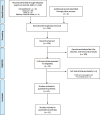Effectiveness of supplementation with quercetin-type flavonols for treatment of viral lower respiratory tract infections: Systematic review and meta-analysis of preclinical studies
- PMID: 33864310
- PMCID: PMC8250479
- DOI: 10.1002/ptr.7122
Effectiveness of supplementation with quercetin-type flavonols for treatment of viral lower respiratory tract infections: Systematic review and meta-analysis of preclinical studies
Abstract
Viral infections of the lower respiratory tract are considered a public health problem. They affect millions of people worldwide, causing thousands of deaths, and are treated with expensive medicines, such as antivirals or palliative measures. In this study, we conducted a systematic review to describe the use of quercetin-type flavonols against lower respiratory tract viruses and discussed the preclinical impact of this approach on different signs and clinical mechanisms of infection. The systematic review was performed in PubMed/MEDLINE, Scopus, Scielo, and Biblioteca Virtual de Saúde (BVS). After the database search, 11 relevant studies were identified as eligible. The analysis of these studies showed evidence of antiviral activity of quercetin-type flavonols with significantly reduced mortality rate (M-H = 0.19, 95% CI: 0.05 to 0.65, p-value = 0.008) of infected animals and a reduction in the average viral load (IV = -1.93, 95% CI: -3.54 to -0.31, p-value = 0.02). Additionally, quercetin and its derivatives reduced the amount of proinflammatory cytokines, chemokines, reactive oxygen species, mucus production, and airway resistance in animals infected with a respiratory virus. Overall, supplementation with quercetin-type flavonols is a promising strategy for treating viral-induced lower respiratory tract infections.
Keywords: chemoprophylaxis; flavonoids; influenza virus; quercetin; rhinovirus; virus-induced lower respiratory tract infections.
© 2021 John Wiley & Sons Ltd.
Conflict of interest statement
The authors declare that they have no conflict of interest.
Figures





References
-
- Álvarez, P. , Alvarado, C. , Puerto, M. , Schlumberger, A. , Jiménez, L. , & De la Fuente, M. (2006). Improvement of leukocyte functions in prematurely aging mice after five weeks of diet supplementation with polyphenol‐rich cereals. Nutrition, 22(9), 913–921. 10.1016/j.nut.2005.12.012 - DOI - PubMed
-
- Batiha, G. E. , Beshbishy, A. M. , Ikram, M. , Mulla, Z. S. , Abd El‐Hack, M. E. , Taha, A. E. , … Ali Elewa, Y. H. (2020). The pharmacological activity, biochemical properties, and pharmacokinetics of the major natural polyphenolic flavonoid: Quercetin. Foods, 9(3), 374. 10.3390/foods9030374 - DOI - PMC - PubMed
-
- Bentz, A. B. (2017). A review of quercetin: Chemistry, antioxidant properties, and bioavailability. Journal of Young Investigators. Retrieved from https://www.jyi.org/2009‐april/2017/10/15/a‐review‐of‐quercetin‐chemistr...
Publication types
MeSH terms
Substances
LinkOut - more resources
Full Text Sources
Other Literature Sources
Medical

